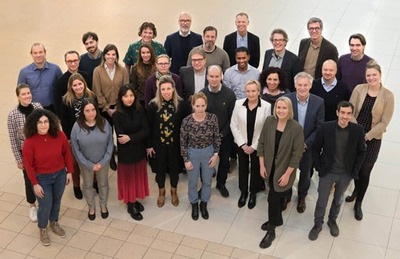Funded by the EU and coordinated by Helsinki University Hospital (HUS), the ONCOVALUE project is building a seamless and automated method to support evaluating the effectiveness of novel cancer therapies. The project brings together six leading European cancer hospitals and three technology companies.
Reliable and comparable data on the real-life effectiveness of treatments
Project Manager Nea Hellman from HUS outlines the goals of the project: “The main goal of this four-year project is to collect, as comprehensively and promptly as possible, real-world data (RWD) stored in the patient information systems of European cancer hospitals, thus obtaining reliable information on the real-life effectiveness of cancer therapies given to patients. The project aims to develop a standardised and automated way of collecting information so that it is reliable, consistent and comparable across the hospitals involved in the project.”
The research mainly focuses on drug therapies for breast cancer and lung cancer. The project combines patient data on clinical outcomes, patient-reported quality of life, and costs on the patient group-level for analysis. The methods developed in the project can also be applied to other types of cancer and, at best, can accelerate the introduction of novel, effective cancer medications. On the other hand, patient groups that do not benefit from treatment can be identified, which allows therapies to be targeted to those who will truly benefit from them. With the general cost pressures in healthcare, it is important to know the real benefits of medications for patients.
Data collection supported by artificial intelligence and machine learning
The aim of the methods developed in the project are to record information in patient information systems in a standardised manner and to collect it automatically into a data pool for further analysis. The project is developing ways to gather data with the help of artificial intelligence and machine learning, both from structured data (structured data fields, e.g. from the patient information system Apotti) and unstructured data (e.g. free-text medical statements or radiological images).
The projects work packages also work on examining the regulatory requirements and guidelines for studying and sharing real-world data and the related ethics requirements and legislation. The development of this area is also being followed closely.
Pioneers in the field involved in co-research
Under the leadership of HUS, leading European cancer hospitals and commercial businesses are participating in the research work of the ONCOVALUE project. Six academic hospitals are involved in conducting impactful research. For example, consortium partner Netherlands Cancer Institute (NKI) has strong expertise in Health Technology Assessment (HTA), while Rigshospitalet plays a central role in developing standards and guidelines related to structured data together with HUS and other partners. The CleverHealth Network ecosystem partners, such as pharmaceutical companies, could potentially be contacted in evaluating the project’s results.
Siemens Healthineers has brought its expertise to the project, including Artificial Intelligence technology for automatic interpretation of radiological images. The project is studying computed tomography images on breast and lung cancer patients, aiming to assess the disease progression fully automatically from a series of follow-up images. “The ability to automatically quantify how much metastases are growing or shrinking under different therapies will unlock new insights and add an additional layer of robustness and accuracy to the analysis of real-world data,” says Tobias Heimann, Head of Artificial Intelligence Germany, from Siemens Healthineers.
BC Platforms, on the other hand, is involved in a work package related to the use and sharing of real-world data, where a federated model is being built to analyse data related to cancer therapies. The federated model in this project is based on harmonizing data to the Observational Medical Outcomes Partnership (OMOP) common data model. Data is harmonised so that information from different hospitals can be compared to each other without aggregating it. One of the main barriers to the efficient use of real-world data has been the lack of a standardised data model, which complicates data sharing between registries.
“BC Platforms supports the ONCOVALUE initiative via federated technology and data analysis as well as reporting tools for RWD reporting in real time. BC Platforms hopes that this consortium will lead to better, more environmentally sustainable therapies, technologies, and digital solutions for cancer care,” says Anni Ahonen-Bishopp, Director, Discovery & Research Platform.
Aiming for a replicable model
The ONCOVALUE project has now reached a stage where a federated model is being constructed for sharing patient group-level data, in which it is impossible to link the information back to individual patients. The model being built during the ONCOVALUE project is intended for research purposes, with the aim that a similar model could later be built to production use. The goal is that eventually, this federated model can provide information, for example, on the real-life efficacy of a particular drug from several different hospitals, thus providing a broader knowledge base for decision-making.
In conclusion, Nea Hellman says: “The methods developed in the project can be used to improve the operations of the Comprehensive Cancer Center, structured data entry, and structuring data utilizing artificial intelligence. We also aim to narrow the gap between research work and day-to-day patient care and to develop the ways real-world data is produced and used. I believe that the methods built in the ONCOVALUE project will be replicable in the future for evaluating the treatments of other diseases as well.”
ONCOVALUE consortium partners:
HUS Helsinki University Hospital (FI), Stichting Het Nederlands Kanker Instituut-Anton (NL), STICHTING RIJNSTATE ZIEKENHUIS (NL), Elevate BV (NL), IQVIA Solutions BV (NL), Rigshospitalet Copenhagen University Hospital (DK), BC Platforms LTD OY (FI), Siemens Healthcare AG (GER), Instituto Portugues de Oncologia do Porto (PT), Istituto Romagnolo per lo Studio deiTumori “Dino Amadori” (IT), CIAOTech Srl (IT), TTOPSTART BV (NL).
ONCOVALUE coordination team from HUS:
· Johanna Mattson, Scientific & Clinical lead
· Pekka Kahri, Coordinator
· Nea Hellman, Project manager
· Samu Eränen, WP1 lead
· Sami Pakarinen, WP5 lead
· Mikko Juvonen, Technical lead
· Anne Kemppainen, Financial controller
Read more: https://ONCOVALUE.org/

